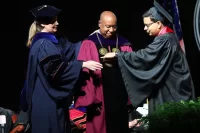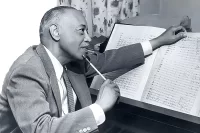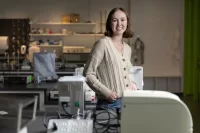Morgan Dewdney ’19 of Meriden, N.H., was already interested in economic consulting when he started a summer internship at Analysis Group, a Boston-based firm.
At Analysis Group, which as a core employer in the Bates Purposeful Work internship program prioritizes hiring Bates interns each summer, Dewdney got an in-depth look at the field as he worked on an analysis for an antitrust case — and discovered he liked working as part of a team.
“The collaborative nature of the work and of this specific analysis I did is something that I’ll remember and take away with me,” Dewdney said.
As its name suggests, Analysis Group provides analysis and expertise to businesses and agencies in a variety of fields, and often in litigation cases.
For example, a current project involves helping distributors and manufacturers of opioid medications identify theft and abuse. In 2015, the firm provided statistical analysis to support the NFL Players Association in its winning appeal of Tom Brady’s “Deflategate” suspension in district court (the suspension was later reinstated by an appeals court.)
“If you want to apply those skills you learn at school in a real-world environment for clients working on real cases, there’s really no better outlet than a place like Analysis Group.”
The firm has strong ties to Bates: Its co-founder, Trustee Emeritus Bruce Stangle ’70, has mentored countless Bates students who are interested in business, and the Alumni Association’s Stangle Award for Distinguished Service is named after him.
Dewdney, along with fellow Bates interns Alexia Sahue ’19 of Abidjan, Côte D’Ivoire, and Michael Somma ’19 of Colts Neck, N.J., found that their work directly contributed to AG’s cases. Here, Sahue, Somma, and Dewdney talk about what they do as AG interns and what makes their work meaningful.
What appealed to you about interning for Analysis Group?
Morgan Dewdney: I heard about Analysis Group from the Bates Career Development Center. I really liked all the aspects of the company that were given to me by the BCDC and from what I could read online. It seemed like Bates had a really strong tie with this company. That was really was what piqued my interest.
Michael Somma: Taking economics classes at Bates set the precedent for this experience. If you’re very interested in economic theories, statistics, and econometrics, and want to apply those skills you learn at school in a real-world environment for clients working on real cases, there’s really no better outlet than a place like Analysis Group.
Alexia Sahue: What made me really excited about working at AG was the opportunity to work with people who are as smart as or smarter than you are. This is something that AG emphasizes every single time there is an informational session at Bates — you’re really surrounded by people who are learning so much on a daily basis.
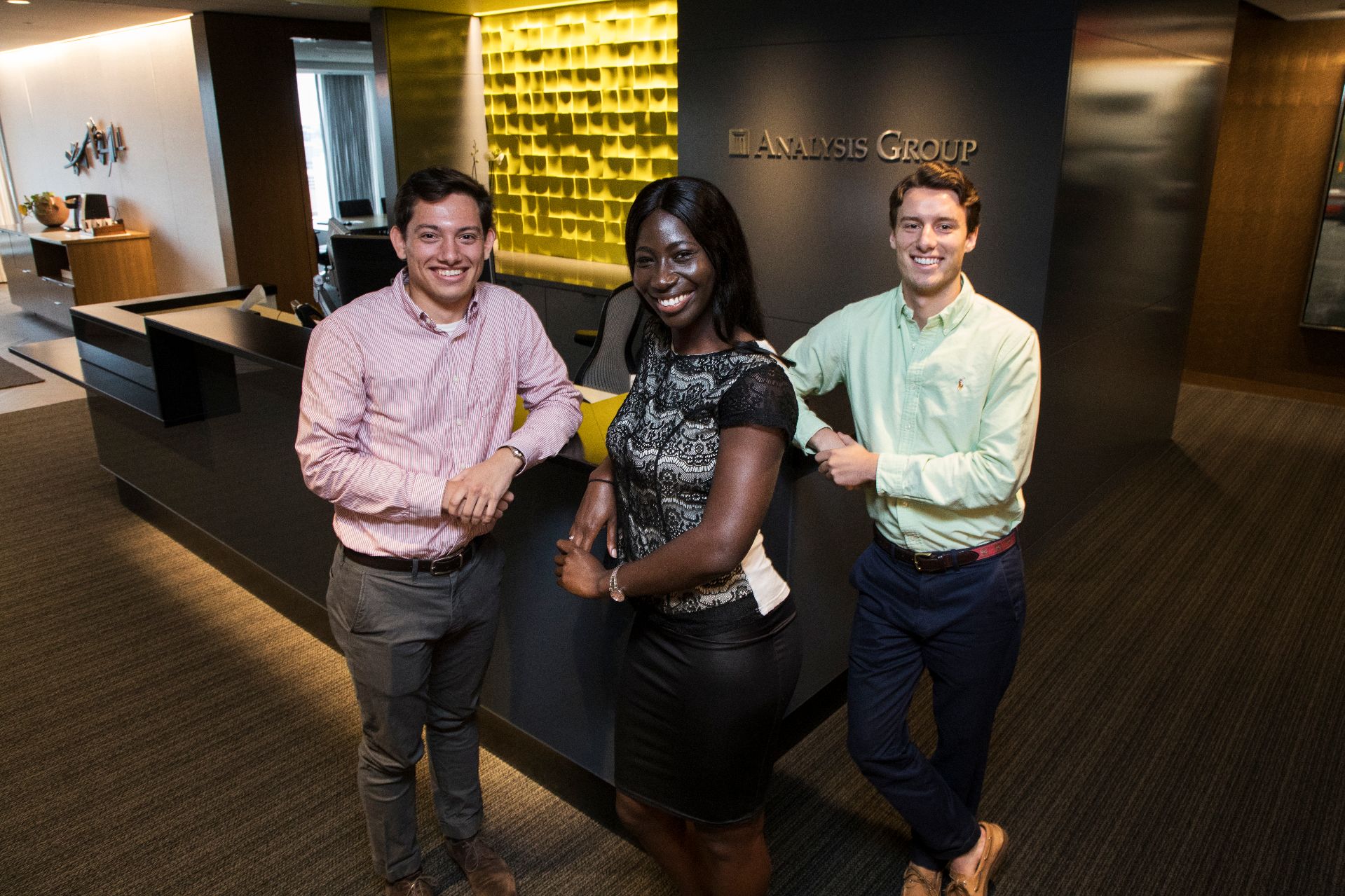
Michael Somma ’19, Alexia Sahue ’19, and Morgan Dewdney ’19 are interns at Analysis Group in Boston. (Theophil Syslo/Bates College)
What was it like to apply for the internship?
AS: I applied to Analysis Group when I was studying in China in the fall. My interviews were through Skype. I did not get the chance to actually meet anyone here until January, when I got back to the U.S. and was invited for a lunch. People got to know me, which is something that I think is very specific about AG — they’re really interested in getting to know you as a person. It was great for me to feel like people were interested in knowing my story, where I was coming from, what my dreams were, and how I will be a best fit at AG.
What do you do day-to-day for AG?
MD: My case right now is an antitrust case. Day to day, it’s a lot of data analysis — working with different statistical programs, and then taking that data and creating client-ready exhibits, graphs, and charts.
MS: I’ve been doing data analysis for a healthcare litigation case.
As a college student, you may not think that you have a lot to add to such a big company. But some of our experts are actually using the work that we are doing in litigation cases.
AS: I’m working on a litigation case in the healthcare practice area, paired with a little bit of antitrust. I’m doing mainly quantitative work with a different language coding. I’m actually working on a new one right now called SAS that I never used at Bates. It’s been a long process into learning it, but it’s great that I’m able to use different types of language codes.
How does the cycle of work and feedback at a company compare to that of an academic course?
MS: It’s just as rewarding as getting a good grade in school — your case manager saying, ‘That was a really good idea; I’ve never even thought about it that way.’
What do you like most about interning for AG?
AS: As a college student, you may not think that you have a lot to add to such a big company. But some of our experts are actually using the work that we are doing in litigation cases. There is such an emphasis on the strength of each individual regardless of their background, regardless of their age, of their race, and so on. AG is amazing at doing that.
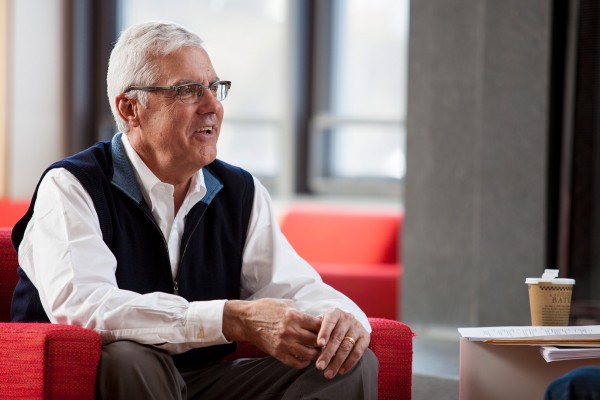
Bruce Stangle ’70, co-founder of Analysis Group, has mentored countless Bates students who are interested in business. (Sarah Crosby/Bates College)
Was there a moment when you realized that you found consulting work meaningful?
MD: There was one analysis that my case team was working on, a pivotal analysis for our case. I didn’t actually create the exhibit that’s going to go out, but I did the initial filtering of the data, compiling a document that then led to the analysis.
On the one hand, I saw all this data and then helped filter it in a way that can be understood by a lot of people who don’t necessarily have an economics background. Then I experienced the teamwork aspect — I created the first document that filtered into this analysis, then another case team member actually did the analysis, and then another case team member created the exhibit. The collaborative nature of the work and of this specific analysis, I think, is something that I’ll remember and take away with me.
MS: The moment when I thought, ‘Wow, I actually really like this,’ was when I took an analysis from start to finish, completely on my own. It was actually a pretty big part of the case, and it’s in the process of being sent over to the lawyers. That was a pretty big moment.
What does Purposeful Work mean to you?
MD: My initial reaction to Purposeful Work was something that was purposeful for the greater good, so maybe more community service–based. It has that aspect, and that’s a really important aspect, but it’s also purposeful for you individually — doing work and having this internship exposed me to the whole consulting field, and has really shown me that I actually really do enjoy it. That’s the purposeful aspect of it.
